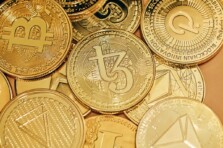Vladimir Okhotnikov is a leading expert analyst in the field of cryptocurrency and blockchain, investor, developer of major blockchain projects.

Vladimir Okhotnikov about myths around cryptocurrencies
Step by step cryptocurrency comes into our lives. Already, entire countries are not just allowing the circulation of cryptocurrency, they prepare to replace their traditional national Fiat.
“Myths are inevitable. They are born of a misunderstanding of the phenomenon. Cryptocurrencies are a phenomenon of such a magnitude that myths must have appeared. In many ways they are related to fears. There is a new asset, quite risky, and people consider all possible risks. It is understandable…”
Vladimir Okhotnikov
Almost at the same time as the crypto, a correspondent mythology was born. Many people get to know the crypto world through myths that distort reality. Myths tend to demonstrate extremes: either hyper-positivity (e.g., it is easy to become a billionaire with cryptocurrency) or, conversely, negativity (e.g., crypto is a global conspiracy). This quite strongly affects the crypto-business and creates a negative information background.
Perhaps, the most mythologized properties of the crypto are reliability, volatility and asset security.
Let’s look at the basic “crypto myths” and see how true they are.
Myth No1. Cryptocurrencies vs fiat: real value security
“Your crypto is empty! It does not have a real value security…”
This statement sounds tragic… and in the vast majority of cases it is perfectly true. Cryptocurrencies, as a rule, are not really secured with anything. Sometimes it is suggested to consider the electricity spent on crypto mining as a security. This idea does not stand up to criticism, in this case, we would consider electricity spent on the printing press as a security of paper money.
It cannot be said that security in crypto business is absent in principle. By their nature, dollar (Euro, Yuan, etc.)-denominated cryptocurrencies (so called stablecoins) must be secured.
A “classic” decentralized crypto like Bitcoin does not in principle imply any collateral, the price is set solely on the basis of the balance of supply and demand. Everything is determined by the market.
“And why do we think cryptocurrency needs collateral at all, unless it’s steablecoin? Decentralized cryptocurrency should not depend on third-party assets, it is an asset in itself. The idea of using fiat currencies and fiat-denominated assets as collateral is particularly illogical. This is a strange hybrid. There is a market, it will determine everything, just don’t bother it…”
Vladimir Okhotnikov
Do critics really find a weakness in cryptocurrencies?
This would be so if fiat currencies also have real security. You have money in your wallet or in your bank account, and you think their value is guaranteed by the issuing state. You will be disappointed: the value of money is not guaranteed by assets, is not connected with GDP, but is supported by an honest word of state.
Do you still believe in the word of the state?
The real value of money exists when it minted from precious metals or could be freely exchanged for precious metals (the principle of the “gold standard”). However, problems with precious coins began in the time of Ancient Rome, when they began to actively add to the gold various completely unprecious impurities. This, by the way, was one of the reasons for the fall of the Roman Empire.
The “gold standard” also did not live long. At the end of the 19th century, most developed countries in Europe guaranteed the possibility of exchange of banknotes for a fixed amount of gold. However, during the economic crisis of 1929-1933 all of them wisely abandoned the gold standard.
In 1944, while the Second World War was still under way, the Bretton Woods system was introduced, providing a “gold currency” standard. The US, as the world’s economic leader, has pledged to trade dollars freely for gold.
In 1965, France officially demanded the exchange of dollars accumulated in the Central Bank for gold, it was more than 16 thousand tons. Americans also officially refused, and in 1971 announced a withdrawal from the “gold exchange” standard.
It was a special story for those who believe in the security of fiat currencies and the word of States.
So decentralized cryptocurrencies have no collateral. However, also have no collateral and modern fiat currencies, At the same time, we have to rely on the word of the state, or rather not the state – it is too general a concept – but individual officials.
That is, in terms of security, cryptocurrencies are not inferior to a fiat. However, there is a fundamental difference: the crypto, unlike the fiat, does not even try to create the illusion of security.
The myth of No2. Cryptocurrencies vs fiat: reliability
“Cryptocurrencies are unreliable and could collapse at any moment…”
In order to discuss this claim substantively, the terms should first be defined.
In terms of technical reliability, cryptocurrencies, at least, do not concede non-cash “bank” money, but in fact, they surpass them. Hacking of bank servers by hackers is, unfortunately, a very common phenomenon. But nobody has yet managed to crack the bitcoin blockchain.
If we talk about reliability in the sense of the possibility of “disabling” cryptocurrencies by state, then, indeed, such a risk exists. However, firstly, it is technically difficult to do this, decentralized blockchain is well protected from “unfriendly” disconnection. Second, the modern fiat financial system is rapidly fragmenting, serious sanctions and trade wars are going on, the seemingly unshakeable US dollar is beginning to lose ground.
Criticizing cryptocurrencies, crypto-skeptics usually forget to mention the fundamental problem of a fiat system – a debt burden that has long exceeded all acceptable levels.
“From the side of “traditional” financiers I see a somewhat arrogant attitude towards cryptocurrencies. They consider her a hipster toy. Although things have been changing over the last couple of years. A person can publicly criticize the crypt, and at the same time buy bitcoins in their own investment portfolio. This means that there is no doubt about the reliability of the crypto…”
Vladimir Okhotnikov
By the end of 2023, US public debt was close to $34 trillion. That’s a fantastic amount, especially with a budget deficit of $1.77 trillion. With current trends, it is clear that this debt is fundamentally unsustainable. This means the inevitability of the crisis, in what form it will occur, it is impossible to predict, obviously only one thing: it will. The authorities will try to mitigate its consequences, but it will not be possible to avoid it.
Today, the world financial system seems to be fairly stable on the surface. However, the uncontrolled emissions to which almost all countries of the world resort are mines ready to explode at any moment and bury the leading economies.
Cryptocurrencies fundamentally do not allow uncontrolled emissions, maintaining the necessary level of money supply does not depend on the selfish wishes of individual states.
If we compare the reliability of cryptocurrencies and traditional fiat currencies, then again, fiat will not have a decisive advantage. Moreover, as soon as the cryptocurrency receives a formal official then it will by reliability, certainly surpass the fiat. Formal approval can be understood, for example, as approval of SEC bitcoin-ETF.
Understanding the benefits of blockchain, states consider adding “state” cryptocurrencies to their fiat systems. However, it is not yet known what properties they will have, so their prospects are not yet obvious.
Myth No3. Cryptocurrencies vs fiat: volatility
“Cryptocurrencies are volatile, so they are risky to use, and especially to use for investment…”
We agree, cryptocurrencies are volatile. The price of Bitcoin, the oldest cryptocurrency, can drastically change times within a month. However, let us again compare the cryptocurrency with other assets.
Crypto-skeptics typically compare the price of Bitcoin to stocks and currencies.
If the object of comparison is to take top currencies, such as the dollar, and stock market indicators of the SP500 level, then the comparison will not be in favor of Bitcoin. Here, rates change by one percent per month.
But is that a fair comparison?
We should compare the same type of objects. Let’s imagine that in place of Bitcoin we have a company incorporated around 2010. This company was regularly accused of fraud, tried to take control of the intelligence services, banned. Its business was restricted, it operates in a market that is not regulated by law and is constantly at risk of conflict with regulators. At times it seemed that it could not withstand the pressure, but it lives and grows despite all the difficulties. And we’re comparing this company to the US market leaders from the SP500. These are obviously disproportionate.
«Now, the capitalization of the entire cryptocurrency market is close to capitalization of Apple, which is just one company from SP500. Bitcoin is not so much affected by the balance of supply and demand. Rumors, influencers’ claims, government decisions affect market dynamics…!»
Vladimir Okhotnikov
«Волатильность никуда не денется, если капитализация криптовалютного рынка кардинально не вырастет. А это произойдет только тогда, когда крипта войдет в повседневную жизнь и будет приносить реальную пользу. Устойчивый и стабильный рост произойдет, когда криптовалюту будут покупать не из-за желания поиграть на бирже…»
Capitalization of cryptocurrencies is not enough to ensure acceptable volatility, so comparing other assets is incorrect.
However, the crypto market has significant growth potential. The nearest event, which can significantly increase the capitalization of Bitcoin, is the already mentioned approval of the SEC Bitcoin-ETF. Bitcoin, which traded only on cryptocurrency exchanges and over-the-counter trading platforms, enters traditional exchanges in the form of derivative paper. New conservative users are joining the market, skeptical of crypto exchanges.
Predicting how much capitalization will increase is now almost impossible. However, any growth will reduce volatility. At the same time, the volatility of fiat currencies may begin to grow as the economic crisis develops.
When an event that affects all of humanity occurs, mythology is inevitable. It is not always fair and correct, but it can influence public opinion. It’s important for us to show that not all myths are true.









